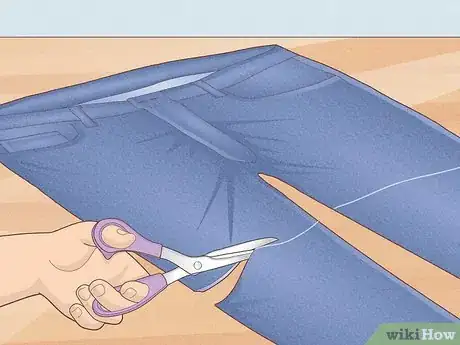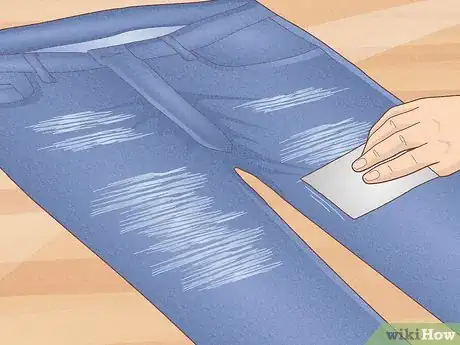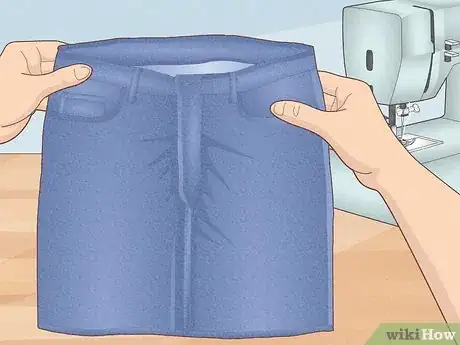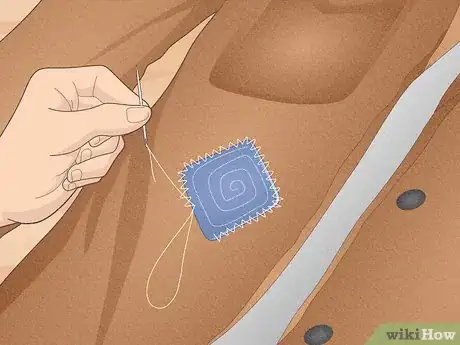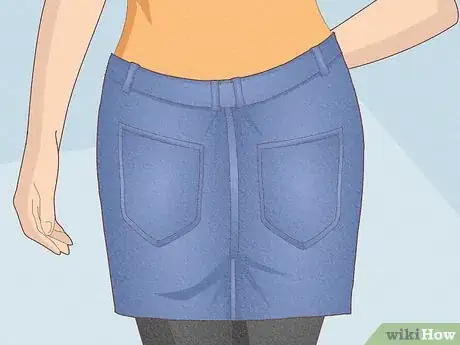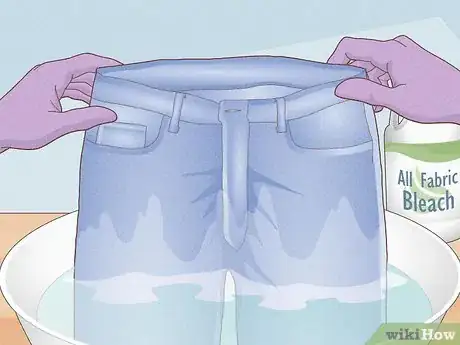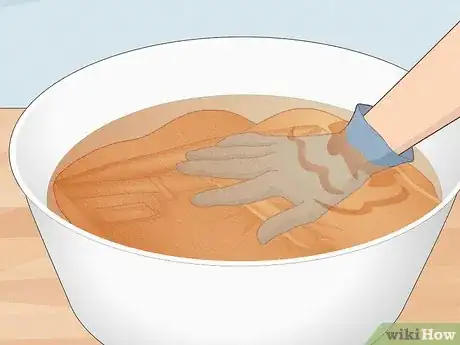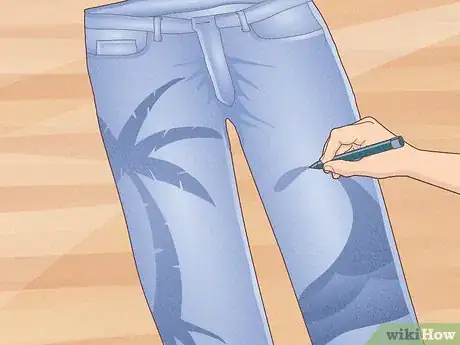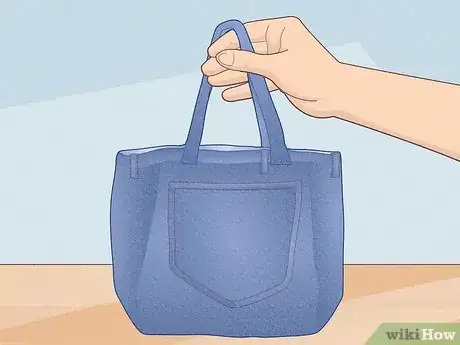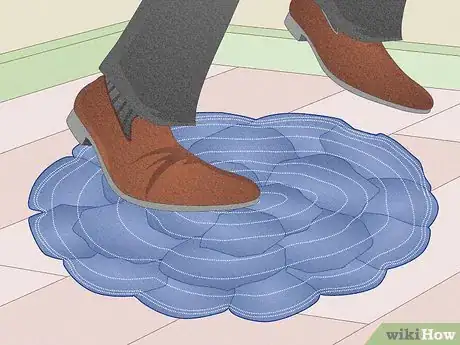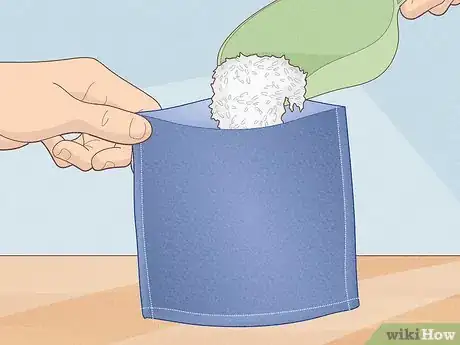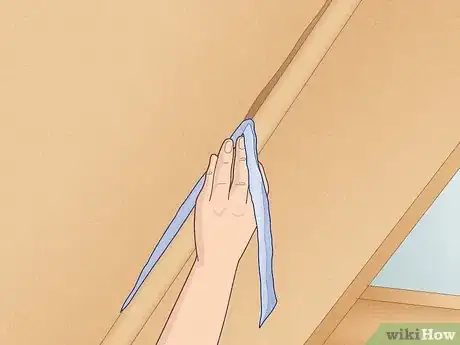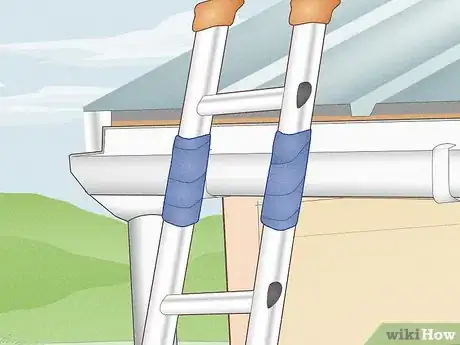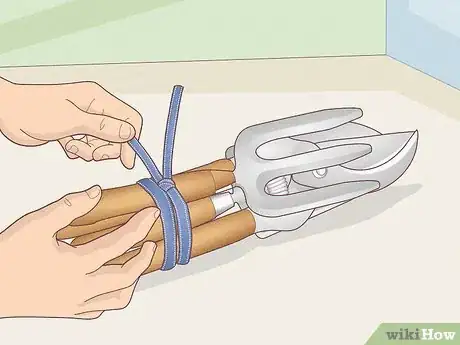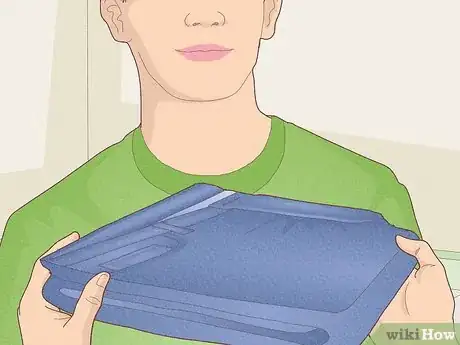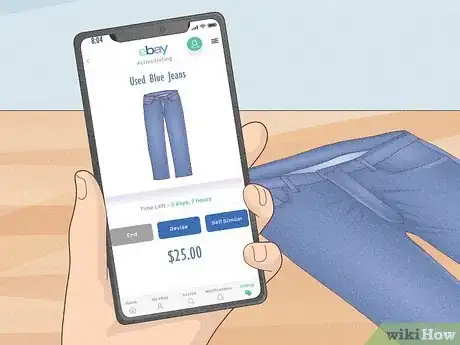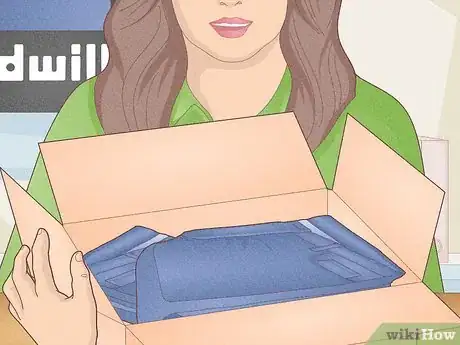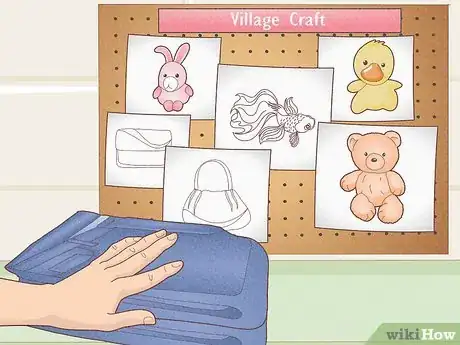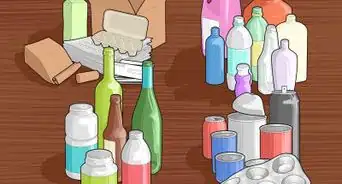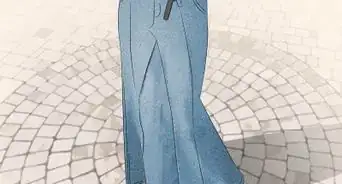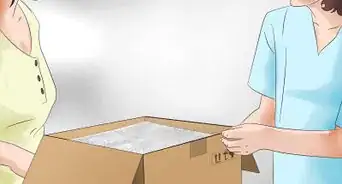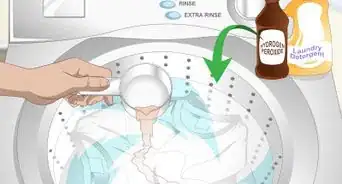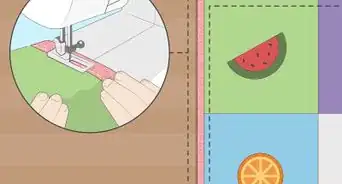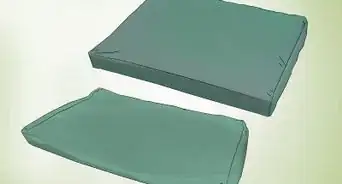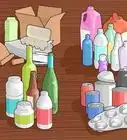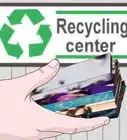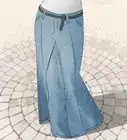This article was co-authored by Kathryn Kellogg. Kathryn Kellogg is the founder of goingzerowaste.com, a lifestyle website dedicated to breaking eco-friendly living down into a simple step-by-step process with lots of positivity and love. She's the author of 101 Ways to Go Zero Waste and spokesperson for plastic-free living for National Geographic.
There are 8 references cited in this article, which can be found at the bottom of the page.
This article has been viewed 33,292 times.
Throwing out a pair of jeans that have grown worn or dirty isn't always a good idea. With a little practical know-how, it's easy to recycle jeans instead of sending them to the landfill. Whether you're looking to turn a tired old pair of 501s into a brand-new piece of clothing or convert it to something with a little more practical use, you have many options.
Steps
Making New Clothing
-
1Make cutoffs. This is the "classic" solution for extending the life of a pair of jeans. Any jeans can be converted to cutoff shorts or capris. All that's needed is to do is cut the legs where you'd like them to end. Use a ruler or tape measure to trace a straight line across each leg, then use a fabric knife or set of scissors to cut. See our cutoff article for step-by-step instructions.
- If you're not sure how high you want your cutoffs, be conservative. You can always cut off more denim. However, you can't add more back once you've cut off too much.
- You don't need to throw away the legs once you cut them off. You can use the material for rags, ties, or patches (see below).
-
2Distress your jeans for a "shredded" look. Have a pair of jeans that's starting to look worn-out? Make a fashion statement by wearing them out more. Cut them, shred them, crush them, or otherwise beat them up to make your own "distressed" denim. See our guide to distressing jeans for lots of specific ideas.
- One beginner-friendly option is to use a cheese grater or a square of sandpaper to wear out your jeans' knees. Shred until white, worn areas begin to develop or you have a set of ragged holes — whichever you prefer.
- This is also a good opportunity to get rid of stains. Shred the stained area until the stain is gone.
Advertisement -
3Make a skirt. If you have some basic sewing knowledge, it's not hard to turn a set of jeans into a skirt or dress. See our main article on this subject for step-by-step instructions. To do this:[1]
- Open the inside seam of both legs.
- Stitch the front part of both legs together to form a new front seam for your skirt.
- Stitch a large piece of fabric between the back part of each leg to complete the skirt.
- Trim the skirt to your desired length.
-
4Use the denim for patching material. If you have another piece of clothing that's looking worn out, consider cannibalizing your jeans to patch up the other item. Cut square or oval sections of fabric from the jeans, then stitch them over the worn-out sections of the other clothes. You can even make your patch look like a deliberate fashion choice by patching the same spot on both sides of a piece of clothing. For instance, you might patch both elbows on a jacket or both knees on a pair of pants.
- To get two patches that are the same size and shape, use a fabric knife or a set of scissors to cut through both layers of denim (front and back) at the same time.
-
5Make an apron. A denim apron uses the jean's waistband and fastener to stay around your waist, so you'll want a pair that fits. Turn your old jeans into a durable apron by following the directions below:
- Cut the jeans to the length you want your apron. For a short apron, cut an inch or so below the pockets. For a longer apron, cut in the middle of the leg.
- Starting at the top of the zipper, cut horizontally until you reach the side seam. Repeat for the other side.
- Sew the legs together to make the front of the apron.
- Put the jeans on backwards so that the pockets are in front. Fasten the waistband behind you to get it to stay on.
-
6Try acid-washing your jeans. Acid-washed denim is perfect for an 80s throwback look. These jeans have large patches that are so bleached that they are nearly white. Use the following method with a dark set of jeans for the most noticeable results. An alternate method is available at our main acid-washing article.
- Mix 2.5 parts water and 1 part bleach in a large bucket.
- If you want a blotchy, tie-dye like pattern, gather small sections of jean fabric and bind them into tight "buds" with rubber bands.
- Dip the jeans into the bleach mixture. Let them sit for 30-60 minutes (longer will give a lighter color).
- Remove the jeans and rinse with clean water. Dry as normal.
-
7Dye the jeans. For most people, denim is synonymous with the color blue. However, there's no reason this has to be the case. With dyes, you can turn old blue jeans into colorful new additions to your wardrobe. Try this easy dip-dying method below (or see our main jean-dying article):
- Soak the jeans in bleach until they are as white as possible. Rinse with water to neutralize the bleach.
- Let the jeans dry. While you wait, mix fabric dye according to the instructions.
- Dip the dry bleached jeans in the fabric dye while wearing leather gloves. Stir the mixture so that they are evenly coated.
- Dip several more times, wringing out the moisture between dips.
- Rinse in water with a little detergent to set the dye. Let the jeans dry.
-
8Re-decorate your jeans. Another way to get new life out of old jeans is to treat them as a canvas for your artistic abilities. Don't be afraid to get creative. You can make your worn-out jeans look amazing with a little imagination. Below are just a few things you may want to try:
- Drawings and doodles. Use a permanent marker or a fabric marker to get designs that stay in your jeans for more than one wash cycle. You may want to trace in pencil first to avoid mistakes.
- Rhinestones and studs. Use a sturdy fabric-safe glue for durability.
- Fancy buttons. Replace the button on your jeans with something more unique or decorative, like a sturdy flower-shaped button or a fabric-covered button in a fun pattern.
- Negative space designs. Trace shapes or designs on your jeans, then carefully cut them out with a fabric knife or set of scissors. Your skin will show through the hole, creating eye-catching contrast.
Making Tools and Accessories
-
1Make a tote bag. Jeans don't just need to be recycled into other types of clothing. Denim is fairly strong, so it's perfect for making sturdy tools and accessories as well. One easy project is to make a tote bag. This is perfect for carrying groceries and using as a purse replacement. To make a tote bag:
- Cut the legs off just below the crotch (as if you were making a very short pair of cutoffs).
- Cut the crotch seam and trim both sides to get something similar to a very short skirt.
- Stitch the bottom flaps of the "skirt" together to make the bottom of the bag.
- Cut two long, skinny strips of fabric from the leftover leg material. Stitch these to the top of the bag to make two handles.
-
2Make rags or placemats. Denim isn't terribly absorbent, so it's not great for towels. However, it is quite durable, so rags cut from it are great for the garage or kitchen. Making denim rags and mats is easy: just cut square sections of fabric from the jeans as needed.
- One simple way to get good-looking rags is to trace two straight, parallel lines across the front of one leg. Cut across both these lines to get a looped section of denim. Slice down one or both seams to get either one or two rags.
- To make pot holders, fold the rags to double- or triple-up the material, then stitch them shut.
-
3Make a heating pad. This easy project is a must for treating back pain or sore muscles. Cut two identical squares of fabric from the jeans (see the trick above for cutting sets of rags). Stitch up three sides tight, leaving the fourth open. Scoop uncooked rice into the opening. Stitch the final side shut. Microwave the pad in 20-second increments until it is warm, then hold it against your sore spots.[2]
- Use a large tube-shaped pad instead of a square to make a neck pillow that's great for painful kinks.
-
4Turn your jeans into insulation material. This is a good choice for leftover sections of denim or jeans that are too ragged or worn-down for other tasks. Cut your jeans into many long strips, then soak these strips in a borax-and-water bath for about five minutes. Squeeze the moisture out of the strips and press them into small gaps in your walls or framing. The denim will dry into a hard, water- and insect- proof insulator.[3]
- Borax is a safe, cheap laundry additive. You can usually find it in the laundry section of department stores or via online retailers.
-
5Use the denim to "scratch-proof" furniture and tools. Denim is durable enough for heavy-duty use, but it's still soft enough that it will never scratch other surfaces. Use scraps of denim to "scratch-proof" objects around the house. Just use glue or adhesive to fix pieces of denim to scratch-prone spots.
- For example, if you want to keep your ladder from scratching your gutters, cut two wide strips of fabric from your jeans. Glue them to both sides of your ladder at the top. When you rest the ladder against the gutters, the soft denim will make contact, rather than the hard metal.
- Another easy idea is to cut small circles of denim and fix them to the bottom of furniture legs to keep them from scratching the floor.
-
6Use the inseams for ties. The thick, doubled-up line of stitched fabric inside each pant leg makes a strong, durable string-like material. You can use it to tie up a wide variety of things. For example, use jean inseams to tie loose tools together for easy transport. You can also use it like a keyring to organize things like measuring cups, wrenches, and other similar sets of objects.
Finding New Owners
-
1Give the jeans to a family member or a friend. Don't want to turn your jeans into anything new? Give them away as hand-me-downs. Get in touch with friends and family members and ask if they'd like your jeans for free. Even if they no longer fit you, they may fit someone you know.
- You can also try giving the jeans to people you know who are interested in crafts and DIY projects (like the ones above) for use as raw materials.
-
2Unload the jeans online. This is a great option if you're looking to make a little extra cash. Sites like Ebay and Craigslist offer convenient options for selling your jeans. You're not likely to get very much money for used jeans (unless they're designer), but something is better than nothing.
- Check other ads for jeans in your area before you price yours. You want to pick a competitive price to stand a good chance of selling your jeans.
- Be sure to clearly list the size, maker, and style of the jeans in your ad. Note any areas of wear. Being honest is important for your reputation as a seller.[4]
-
3Donate to the less-fortunate.[5] Organizations like Goodwill and The Salvation Army will usually accept jeans in a reasonable state of quality. You can also donate your jeans to thrift stores and door-to-door clothing drives. There are a variety of choices available depending on your location, so check a local directory of charities (or an online resource like Guidestar.org).[6]
- Don't forget to keep the receipt — you can deduct the donation from your taxes.[7]
-
4Support local craft organizations. You don't only have to donate jeans to agencies that will use them as clothing. Denim can be used as a raw material by many other organizations as well. Two possible choices are below. The options available near you may vary.[8]
- Local art programs can use denim for rags, craft materials, and paint applicators.
- House-building charities (Habitat for Humanity, etc.) sometimes use jeans as insulation.
Community Q&A
-
QuestionI buy jeans from thrift shops, redesign them by painting and sewing on accessories, etc. When I sell them, should I leave the original labels in, along with my own?
 Puffin 2.0Community AnswerThe original label may be useful for customers to determine their size or style according to brand, and may also indicate that the jeans are good quality. Just make sure that your own label is super clear, perhaps right next to or above the original label, and make sure to emphasize that you did all the decorating when you sell them to make sure you still get proper credit, e.g. advertise them as hand-decorated garments, and list the ways you have decorated each pair on their price tag or in your store (online or physical).
Puffin 2.0Community AnswerThe original label may be useful for customers to determine their size or style according to brand, and may also indicate that the jeans are good quality. Just make sure that your own label is super clear, perhaps right next to or above the original label, and make sure to emphasize that you did all the decorating when you sell them to make sure you still get proper credit, e.g. advertise them as hand-decorated garments, and list the ways you have decorated each pair on their price tag or in your store (online or physical).
References
- ↑ http://www.notmartha.org/tomake/jeanskirt/
- ↑ https://tipnut.com/make-your-own-microwave-heating-pad/
- ↑ http://www.thisoldhouse.com/toh/article/0,,20156207,00.html
- ↑ http://www.ebay.com/gds/General-Info-for-buying-secondhand-jeans-for-resell-/10000000000759862/g.html
- ↑ Kathryn Kellogg. Sustainability Specialist. Expert Interview. 28 June 2019.
- ↑ https://www.guidestar.org/NonprofitDirectory.aspx
- ↑ http://www.goodwill.org/donate-and-shop/donate-stuff/
- ↑ http://www.out.com/fashion/outfit/deluxe-denim/2011/11/02/when-get-rid-and-what-do-old-jeans
